Sociedade Esportiva Palmeiras
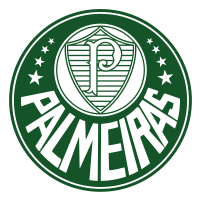 |
|||
| Full name | Sociedade Esportiva Palmeiras | ||
|---|---|---|---|
| Nickname(s) | Verdão (Big Green); Palestra; Porco (Pig); Academia de Futebol (The Football Academy); Campeão do Século (Champion of the Century) |
||
| Founded | August 26, 1914 | ||
| Ground | Palestra Itália (under renovation), Pacaembu (temporary), São Paulo, Brazil (Capacity: 37,952) |
||
| Chairman | |||
| Manager | |||
| League | Campeonato Brasileiro Série A | ||
| 2009 | Campeonato Brasileiro Série A, 5th | ||
|
|||
Sociedade Esportiva Palmeiras, usually called Palmeiras, is a Brazilian football team from São Paulo. The team was founded on August 26, 1914, as Società Sportiva Palestra Italia but changed to the current name on September 14, 1942. It is one of the most popular, traditional and successful Brazilian clubs with almost 17 million supporters including the majority of the Italian immigrants in Brazil. Palmeiras has won 10 national competitions, a record in the country.
The most important titles have been 6 national league titles (4 Campeonato Brasileiros and 2 Torneios Roberto Gomes Pedrosa) and 4 national cups (1 Brazil Cup, 2 Taças Brasil and 1 Brazilian Champion's Cup). Their international trophy hall includes one Libertadores Cup. The team won the competition in 1999, after beating Deportivo Cali from Colombia.
History
Foundation and name
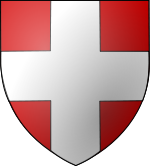
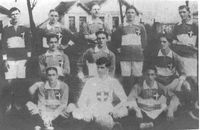

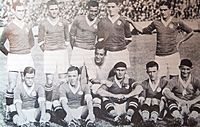
Palmeiras was founded on August 26, 1914, initially as Società Sportiva Palestra Italia, by Luigi Cervo, Vicenzo Ragognetti, Luigi Emanuele Marzo and Ezequiel Simone, four Italian men who were members of the Italian community of São Paulo. Its original colors were red, white and green (those of Italy). The name change occurred during World War II. Brazil entered the war supporting the allies and its dictatorship forced Palestra Italia to change its name because of the reference to Italy. The badge (a white ornamental "P" in a shield) is still present in the current one and the club has used red as a third colour (mostly in friendly games during the club's 75th anniversary).
Several other clubs whose names alluded to enemy foreign countries either disappeared (like Germania) or were renamed during the same period. Another Brazilian club that was once also called Palestra Italia is Cruzeiro Esporte Clube, from Belo Horizonte, Minas Gerais. However Palmeiras was the original Palestra Italia, since it was founded about a decade before Cruzeiro.
Ups and downs
The club has had a rather irregular history alternating between periods of intense success and failure. In the 1960s and early 1970s for instance, the club collected trophies, having played several times the Libertadores Cup and won the Brazilian Championship (Campeonato Brasileiro) twice (1972/73). Then the club found itself in a fifteen-year hiatus without any significant trophies until 1992 when the club signed a sponsorship deal with Italian dairy giant Parmalat; the deal lasted for eight years and quickly turned Palmeiras into Brazil's richest club, allowing the club to purchase many valuable assets for their squad such as Edmundo, Rivaldo, Roberto Carlos, Zinho, and Antonio Carlos Zago. During the Parmalat era (which started in 1992) Palmeiras won the Brazilian Championship twice (1993/94), the Brazilian Cup (1998), the Mercosur Cup (1998) and the Libertadores Cup (1999). Palmeiras went to Division 2 in 2003 but came back to Division 1 the following year as the Division 2 champions.
1999 - Libertadores Cup Winners
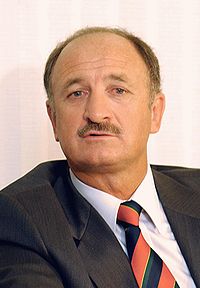
Famous coach Luiz Felipe Scolari led the team to one of the club's most important titles: The 1999 Libertadores Cup. The final match was against Deportivo Cali from Colombia. Important players from that team were World Cup winners Marcos, Zinho and Roque Júnior, as well as Alex de Souza, Evair, Paulo Nunes and César Sampaio. In the first leg, in Cali, Deportivo beat Palmeiras 1-0. In the second leg, at Estádio Palestra Itália, Palmeiras beat Deportivo 2-1 and won the competition in the penalty shootout.
In the same year, in Tokyo, Palmeiras disputed Intercontinental Cup, but being defeated in the final by Manchester United.
2000 - 4 Final Championship Matches
In 2000, Palmeiras disputed 4 Final Championship Matches. At first, the team won the Rio-São Paulo Tournament after beating Vasco da Gama in the final. In the first leg, in Rio de Janeiro, Palmeiras beat Vasco 2-1. In the second leg, at Estádio do Morumbi, the club from São Paulo beat Vasco 4-0.
The club again reached the Libertadores Cup final, this time against Boca Juniors from Argentina. In the first leg, in Buenos Aires, the game ended 2-2. In the second leg, at Morumbi stadium, in São Paulo, the game ended 0-0 and Boca won the competition in the penalty shootout.
In the same year, Palmeiras won Brazilian Champions' Cup after beating Sport Recife in the final. By the end of this year, the club again reached the Mercosur Cup final, but being defeated by Vasco da Gama.
Current Years
Parmalat sponsorship ended in 2000 and left the club in dire straits. After a mildly irregular season in 2001 — the biggest achievement was a Libertadores Cup semifinal against Boca Juniors— the club faced its worst year ever in 2002 and was relegated to the Second Division, which it won in the following year, returning to the First Division in 2004.

Ever since its comeback, the club has been on the rise. The 2004 and 2005 seasons were rather successful when the team qualified for the Libertadores Cup but unfortunately was sent home before the end of the championship.The 2006 season was not good since the team finished the Campeonato Brasileiro in the 16th position, followed by a 7th position in 2007 season.
In 2008 Palmeiras made a partnership contract with Traffic, a Sports Marketing Agency. Besides that, the club made some big investments on some big name players and also on coach Wanderley Luxemburgo. This new strategy paid up, since the club won for the 22nd time the Paulista Championship.
Also in 2008 Palmeiras won the São Paulo State Cup with a 5 X 0 victory over Ponte Preta. Palmeiras also finished 4th in the Campeanato Brasileiro, which qualified them to the 2009 edition of the Copa Libertadores.
Champion of The Century
In its history, the club has won 22 championships of the State of São Paulo and 5 Rio-São Paulo Tournament, but the most important titles have been 6 national league titles ( 4 Campeonato Brasileiros and 2 Torneios Roberto Gomes Pedrosa), 4 national cups (1 Brazil Cup, 2 Taças Brasil and 1 Brazilian Champion's Cup), 1 Libertadores Cup, 1 Mercosur Cup and the 1951 Copa Rio . Palmeiras is recognised as one of Brazil's most victorious clubs. In 1999, the Club was claimed by Federação Paulista de Futebol 'Champion of The 20th Century' in Brazil.
Honours (101)
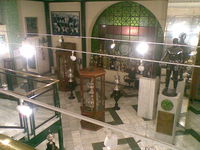
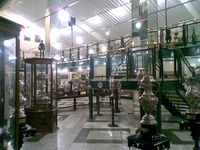
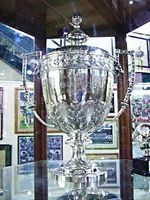
Honours of professional football (96)
Official honours (49)
World Competitions (FIFA) (1)
- Copa Rio: 1951 World champion
Continental Competitions (CONMEBOL) (2)
- Libertadores Cup: 1999
- Mercosur Cup: 1998
National Competitions (CBD/CBF) (10)
- Campeonato Brasileiro First Division: 1972, 1973, 1993, 1994
- Brazil Cup: 1998
- Torneio Roberto Gomes Pedrosa: 1967, 1969
- Taça Brasil: 1960, 1967
- Champions' Cup: 2000
Other National Competitions (CBF) (1)
- Campeonato Brasileiro Second Division: 2003
Inter-state competitions (FPF and FFERJ) (9)
- Rio-São Paulo Tournament: 1933, 1951, 1965, 1993, 2000
- Champion Cup Rio-São Paulo State Tournament: 1926, 1934, 1942, 1947
State of São Paulo Competitions (FPF) (24)
- Campeonato Paulista: 1920, 1926, 1927, 1932, 1933, 1934, 1936, 1940, 1942, 1944, 1947, 1950, 1959, 1963, 1966, 1972, 1974, 1976, 1993, 1994, 1996, 2008
- Campeonato Paulista Extra: 1926, 1938
- São Paulo City Cup: 1945, 1946, 1950, 1951
Friendly Tournaments (46)
International Tournaments (26)
- Copa Rio: 1951
- Ramon de Carranza (Spain): 1969, 1974, 1975
- Brasil-Argentina Tournament (Argentina): 1936, 1945
- Mission Tournament (Uruguay): 1947
- Roberto Gomes Pedrosa International Tournament (Argentina): 1956
- Mexico Tournament (Mexico): 1959
- Manizales City Tournament (Colombia): 1962
- Lima City Cup (Peru): 1962
- Five Clubs Mexico Cup (Mexico): 1963
- Firenze Cup (Italy): 1963
- João Havelange Four International Clubs Tournament (Brazil): 1966
- Brazil-Japan Cup (Japan): 1967
- Barcelona Cup (Spain): 1969
- Greece Cup (Greece): 1970
- Mar del Plata Tournament (Argentina and Uruguay): 1972
- Italian Imigration Cup: 1975
- Kirin Cup: *1978
- Euro-America Cup: 1991, 1996
- Nagoya Cup: 1994
- Brazil-Italy Cup: 1994
- Naranja Cup (Spain): 1997
- Friendship Tournament (USA): 1997
- Lev Yashin Tournament: (Russia) 1994
- Estudiantes Century Championchip: (Argentina) 2005
'*Kirin Cup was shared with Borussia Mönchengladbach
National Tournaments (20)
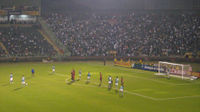
- Rio-São Paulo Champions Cup: 1926, 1934, 1942, 1947
- Porto Alegre Cup: 1936
- Paraná Tournament: 1938
- Fortaleza Tournament: 1938
- Pacaembu Stadium Cup: 1940
- Belo Horizonte Tournament: 1945
- Rio Grande do Sul Tournament: 1964
- Four Clubs Cup São PauloxRio: 1952
- Recife Cup: 1955
- Maringá Tournament: 1969
- Paraná Four Clubs Cup: 1984
- Goiás Tournament: 1997
- Torneio Maria Quitéria: 1997
- Taça dos Invictos (The Invincibles Cup): 1934, 1972, 1973, 1989
Amateur football (3)
Youth competitions (2)
- Super Copa São Paulo de Juniores: 1995
- Torneo Internazionale Under 19 Bellinzona (Switzerland): 2007
Women competitions (1)
- Paulista Women's Football Championship: 2001
Stadium
Palmeiras plays home games at the Palestra Italia Stadium. In the past its capacity was listed as 35,000 spectators. However, even though its grandstands have been extended in the late 1990s, currently it seats 27,640 people [1] due to regulations enforcing improved safety and comfort. The venue is also known as Parque Antártica because the area was a park built by Antarctica Paulista Company in the beginning of the last century, being acquired by Palmeiras in 1920.
Local derbies against São Paulo are still played at home while derbies against Corinthians are usually played in larger stadium.
There is a rebuild in course to reformulate all installation until December 2010. The project offers the first FIFA ready stadium in South America, announcing as Multi Purpose Events Arena (shows, seminars, meetings, parties, etc.). Capacitiy will be increased upt to 43,000 seats and 2,000 press staff, on soccer games. Many other facilities will be in place as: enhanced parking area, VIP area, 03 Restaurant and Bar, Helicopter Point, etc.
On July 9, 2010, Palmeiras played its last match in Palestra Itália against Boca Juniors in an international friendly, due to the construction of the new stadium, the Arena Palestra Itália.
The Arena Palestra Itália will hold up to 43,000 seats and should be inaugurated in November 2012.
Club colours

Palmeiras first kit is of green jerseys, white shorts and green socks. Palmeiras first jersey was green with a horizontal white band across, with a red and white Savoy cross as crest [2]. Palmeiras have played in blue shirts twice as a tribute to the Italian National Team. Their supporters are also well known for the mancha verde (green spot), when Palmeiras is entering the pitch,supportters use a deep green fog.
From 2007 to 2009 Palmeiras also used a third jersey, which is a light yellow shirt with a dark green shorts and socks.
In 2010 Palmeiras retired the light yellow jersey and started using a BLue and white shirt, with white shorts, for their third jersey.
Official Mascot
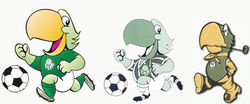
The club's official mascot is a green parakeet.
However, during the late 1960s, fans of Palmeiras' bigger rival Corinthians, would refer to the team as "Pig", due to Prankster/Killjoy behaviour (Espírito de Porco in Portuguese) and soon after, other teams would follow.
In 1986, at the Campeonato Paulista playoffs, supporters have adopted the pig like their mascot.,[3] Although the parakeet is the official mascot, fans will refer to and yell: "PORCO!" (Pig) enthusiastically during matches, as the pig became their better known mascot.
Supporters
Traditionally, Palmeiras is a club heavily supported by the Italian descendants. Nowadays, however, the club also support other kind of people.
Palmeiras biggest ultras are Mancha Alvi-Verde (in English: White and Green Stain - based on the Mickey Mouse Enemy "Phantom Blot", in a green version), TUP (which is the oldest ultra), Acadêmicos da Savóia, Porks and others.
Anthem
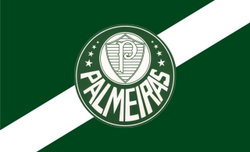
Palmeiras anthem was composed in 1949 by conductor Antonio Sergi. Sergi also wrote the lyrics for the anthem, but did that under the pseudonym Gennaro Rodrigues.
Quando surge o alviverde imponente
(When the imposing white-green emerges)
No gramado em que a luta o aguarda
(On the pitch where battle awaits)
Sabe bem o que vem pela frente
(Aware of what lies ahead)
Que a dureza do prélio não tarda
(That the hardness of the game is approaching)
E o Palmeiras no ardor da partida
(And Palmeiras, in the heat of the match)
Transformando a lealdade em padrão
(Making a pattern out of loyalty)
Sabe sempre levar de vencida
(Always knows how to emerge as the winner)
E mostrar que de fato é campeão
(And show that it's indeed the champion)
Defesa que ninguém passa
(Impenetrable defense)
Linha atacante de raça
(Vigorous attacking line)
Torcida que canta e vibra
(Singing, cheering supporters)
Por nosso alviverde inteiro
(For our white-green whole)
Que sabe ser brasileiro
(Who know how to be Brazilian)
Ostentando a sua fibra
(Boasting its fiber)
Rivals
Palmeiras' biggest rival is Corinthians. The rivalry between the two clubs is considered one of the most intense in the world, and their matches are known as The Paulista Derby. São Paulo FC is another direct rival; the games between the two clubs are called Choque-Rei (King Clash).
Cultural references
Palmeiras was featured heavily in the film O Casamento de Romeu e Julieta where the rivalry between Palmeiras and Corinthians plays a major role in the plot.
Notable players
Goalkeeper Marcos has performed fantastically this season, both in his role as a goalkeeper and as team captain.
Notable managers
Current squad
Note: Flags indicate national team as has been defined under FIFA eligibility rules. Players may hold more than one non-FIFA nationality.
|
|
Out on loan
Note: Flags indicate national team as has been defined under FIFA eligibility rules. Players may hold more than one non-FIFA nationality.
|
|
Sul-Americana 2010 Squad
Note: Flags indicate national team as has been defined under FIFA eligibility rules. Players may hold more than one non-FIFA nationality.
|
|
Current staff
| Position | Name |
|---|---|
| Head Coach | |
| Assistant Coach | |
| Football Supervisor | |
| Goalkeeping Coach | |
| Fitness Coaches | |
| Club Doctors | |
| Physiotherapists | |
| Masseurs |
Famous matches
- Palestra Italia 2-0 Savoia — 1915
- Palestra Italia 11-0 Internacional — 1920
- Palestra Italia 8-0 Corinthians — 1933 Campeonato Paulista Match
- Palmeiras 2-2 Juventus — 1951 Copa Rio Final Match
- Palmeiras 6-7 Santos — 1957 Campeonato Paulista Season Match
- Palmeiras 2-1 Santos — 1959 Paulista Super League Final Match
- Palmeiras 2-1 Barcelona — 1969 Friendly Match
- Palmeiras 2-0 Real Madrid — 1969 Ramón de Carranza Final Match
- Palmeiras 1-0 Corinthians — 1974 Campeonato Paulista Final Match
- Palmeiras 3-1 Real Madrid — 1975 Ramón de Carranza Final Match
- Palmeiras 2-2 Santos — 1983 Campeonato Paulista Season Match
- Palmeiras 2-0 São Paulo — 1993 Campeonato Paulista Semi Finals
- Palmeiras 4-0 Corinthians — 1993 Campeonato Paulista Final Match
- Palmeiras 3-2 São Paulo — 1994 Campeonato Paulista Match
- Palmeiras 6-1 Boca Juniors — 1994 Libertadores Cup
- Palmeiras 3-1 Corinthians — 1994 Brazilian Serie A Final Match
- Palmeiras 5-1 Grêmio — 1995 Libertadores Cup Quarterfinal Match
- Palmeiras 6-1 Borussia Dortmund — 1996 Euro-America Cup Finals
- Palmeiras 6-0 Santos — 1996 Campeonato Paulista Regular Season Match
- Palmeiras 2-0 Cruzeiro — 1998 Brazil Cup Final Match
- Palmeiras 1-0 Cruzeiro — 1998 Mercosur Cup Final Match
- Palmeiras 4-2 Flamengo — 1999 Brazil Cup Quarterfinal Match
- Palmeiras 4-2 Vasco da Gama — 1999 Libertadores Cup Round of 16
- Palmeiras 0-2 Corinthians (Penalties shootouts: 4-2) — 1999 Libertadores Cup Quarterfinal Match
- Palmeiras 3-0 River Plate — 1999 Libertadores Cup Semifinal Match
- Palmeiras 2-1 Deportivo Cali (Penalties shootouts: 4-3) — 1999 Libertadores Cup Final Match
- Palmeiras 7-3 Cruzeiro — 1999 Mercosur Cup
- Palmeiras 0-1 Manchester United — 1999 Intercontinental Cup Final Match
- Palmeiras 4-0 Vasco da Gama — 2000 Torneio Rio - São Paulo Final Match
- Palmeiras 3-1 Peñarol (Penalties shootouts: 3-2) — 2000 Libertadores Cup Round of 16
- Palmeiras 3-2 Corinthians (Penalties shootouts: 5-4) — 2000 Libertadores Cup Semifinal Match
- Palmeiras 0-0 Boca Juniors (Penalties shootouts: 2-4) — 2000 Libertadores Cup Final Match
- Palmeiras 3-4 Vasco da Gama — 2000 Mercosur Cup Final Match
- Palmeiras 3-3 Cruzeiro (Penalties shootouts: 5-4) — 2001 Libertadores Cup Quarterfinal Match
- Palmeiras 2-2 Boca Juniors (Penalties shootouts: 2-3) — 2001 Libertadores Cup Semifinal Match
- Palmeiras 4-0 Corinthians — 2004 Campeonato Brasileiro
- Palmeiras 3-1 São Paulo — 2006 Campeonato Brasileiro
- Palmeiras 3-0 Corinthians — 2007 Campeonato Paulista
- Palmeiras 4-1 São Paulo — 2008 Campeonato Paulista
- Palmeiras 2-0 São Paulo - 2008 Campeonato Paulista Semifinal Match
- Palmeiras 5-0 Ponte Preta - 2008 Campeonato Paulista Final Match
- Palmeiras 1-0 Colo-Colo — 2009 Libertadores Cup
- Palmeiras 3-0 Corinthians — 2009 Campeonato Brasileiro
- Palmeiras 4-3 Santos — 2010 Campeonato Paulista
- Palmeiras 3-0 Vitória — 2010 Copa Sudamericana
Top scorers
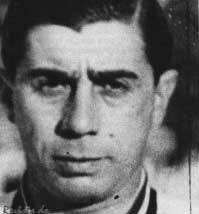
These are Palmeiras's top scorers since its foundation (data as of May 12, 2006):
| # | Name | Goals | Years |
|---|---|---|---|
| 1 | Heitor | 284 | 1916–31 |
| 2 | César Maluco | 180 | 1967–74 |
| 3 | Ademir da Guia | 153 | 1961–77 |
| 4 | Lima | 149 | 1938–54 |
| 5 | Servílio | 140 | 1963–68 |
| 6 | Evair | 127 | 1991–94, 1999 |
| 7 | Humberto | 126 | 1953–58, 1960–61 |
| 8 | Rodrigues | 125 | 1950–55 |
| 9 | Luizinho | 123 | 1935–41 |
| 10 | Tupãzinho | 122 | 1963–68 |
Presidents
The club associates congregate in a general assembly every four years to elect the seventy-six members of the Conselho Deliberativo (Deliberating Council)[4] who in their turn chose amongst them a president for a two-year mandate [5]. As of 2006 the president can only be re-elected once [6].
These are all Palmeiras presidents since the club's foundation [7],[8]:
|
|
|
Sponsors
Current Sponsors
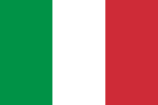 Fiat (2008-09), (2010-)
Fiat (2008-09), (2010-) Parmalat (1992-00), (2010-)
Parmalat (1992-00), (2010-)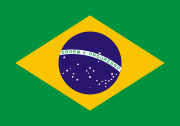 Unimed (2010-)
Unimed (2010-)
Former Sponsors
 Agip (1985-88[9])
Agip (1985-88[9])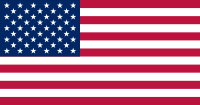 Coca-Cola (1989[10]-92)
Coca-Cola (1989[10]-92) Pirelli (2001-07)
Pirelli (2001-07)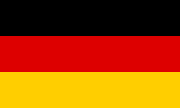 Siemens (secondary sponsor, jersey sleeves only, 2005)
Siemens (secondary sponsor, jersey sleeves only, 2005)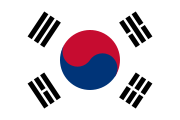 Samsung (2009-10)
Samsung (2009-10) Suvinil (secondary sponsor, jersey sleeves only, 2008)
Suvinil (secondary sponsor, jersey sleeves only, 2008)
Apparel Suppliers
Current Supplier
- Adidas (1976-93), (2006-)
Former Suppliers
- Rhumell (1993-96), (1999-03)
- Reebok (1996-99) - Palmeiras B Team
- Diadora (2003-05)
Palmeiras B Team
Palmeiras has a "second" team that plays the second division of the Paulista Championship (Série A2).
Other sports
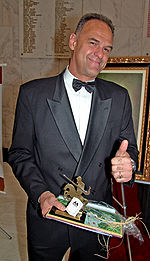
Palmeiras has a victorious tradition in various sports, such as rink hockey and basketball. Leandro Barbosa and Oscar Schmidt, two of the best Brazilian basketball players of all time, started their careers at Palmeiras.
References
- ↑ [1]. 'Federação Paulista de Futebol, article "Estádio_Palestra_Itália". Accessed on January 03, 2008.
- ↑ Almanaque do Futebol Paulista 2000, by José Jorge Farah Neto and Rodolfo Kussarev Jr., published by Editora Panini Brasil and A Bola da Bola, page 414.
- ↑ "Palmeiras" (in Portuguese). Pelé.net. http://noticias.uol.com.br/pelenet/palmeiras/ficha.jhtm. Retrieved 2008-09-28.
- ↑ Estatuto da Sociedade Esportiva Palmeiras (club statute), art. 52.
- ↑ Estatuto da Sociedade Esportiva Palmeiras (club statute), art. 83.
- ↑ Estatuto da Sociedade Esportiva Palmeiras (club statute), art. 113.
- ↑ Sociedade Esportiva Palmeiras official records and meeting minutes
- ↑ [2]. Terra, Chapter "Palmeiras Minha Vida", article "Presidentes do Palmeiras". Accessed on December 24, 2007.
- ↑ /http://placar.abril.com.br/capas/capas/1988/0927.jpg)
- ↑ /http://placar.abril.com.br/capas/capas/1989/0984.jpg)
External links
- Palmeiras Official Site (Portuguese) (English)
- Fifa Classic Club (English)
- Mondo Palmeiras (Portuguese)
- Palestrinos (Portuguese)
- Parmerista! (Portuguese)
- Força Verdão (Portuguese)
- Adidas: Palmeiras Home Page (Portuguese)
- Palmeiras Non-official Site (Portuguese)
- Palmeiras On-Line Non-official Site (Portuguese)
- Canal Palmeiras (Portuguese)
- Mancha Verde (Portuguese)
- Palmeiras Todo Dia (Portuguese)
- Turma do Amendoim Site (information site) (Portuguese)
- Só Palmeiras (Portuguese)
- Acadêmicos da Savóia (Portuguese)
- Memória Alviverde (Portuguese)(English)
- Palmeiras Blog on TheOffside.com (English)
- Campeoníssimo (Portuguese)
|
Sociedade Esportiva Palmeiras
|
||
| Preceded by Atlético Mineiro 1971 |
Champions 1972 (first title) – 1973 (second title) |
Succeeded by Vasco 1974 |
| Preceded by Flamengo 1992 |
Champions 1993 (third title) – 1994 (fourth title) |
Succeeded by Botafogo 1995 |
|
|||||||||||||||||||||||
|
|||||
|
||||||||
|
||||||||||||||||||||||||||